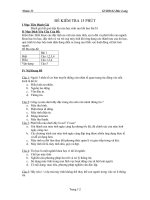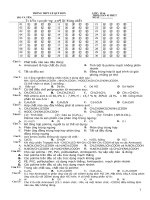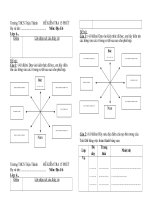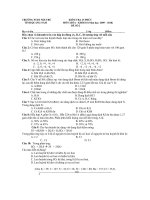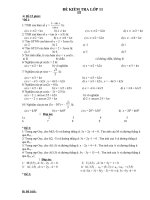de kiem tra 15 phut - lop 12
Bạn đang xem bản rút gọn của tài liệu. Xem và tải ngay bản đầy đủ của tài liệu tại đây (134.05 KB, 4 trang )
Name: …………………………………….Class : ………….Test 15 minutes ( No 1 )
Read the passage carefully and choose the correct answer.
Body postures and movements are frequently indicators of self-confidence, energy, fatigue, or status. Cognitively,
gestures operate to clarify, contradict, or replace verbal messages. Gestures also serve an important function with regard
to regulating the flow of conversation. For example, if a student is talking about something in front of the class, single nods
of the head from the teacher will likely cause that student to continue and perhaps more elaborate. Postures as well as
gestures are used to indicate attitudes, status, affective moods, approval, deception, warmth, arid other variables related
to conversation interaction.
The saying "A picture is worth a thousand words" well describes the meaning of facial expressions. Facial
appearance - including wrinkles, muscle tone, skin coloration, and eye color-offers enduring cues that reve1il information
about age, sex, race, ethnic origin, and status.
A less permanent second set of facial cues-including length of hair, hairstyle, cleanliness, and facial hair-relate to an
individual's idea of beauty. A third group of facial markers are momentary expressions that signal that cause changes in
the forehead, eyebrows, eyelids, cheeks, nose, lips, and chin, such as raising the eyebrows, wrinkling the brow, curling
the lip.
Some facial expressions are readily visible, while others are fleeting. Both types can positively or negatively reinforce
the spoken words and convey cues concerning emotions and attitudes.
1. Gestures _________.
a. can do nothing with a conversation
b: can clarify the meaning of verbal messages.
c. may interrupt the flow of a conversation
d. can end a conversation more quickly than usual
2. A nod of the head from the teacher will likely ask his student to _______ what he is saying.
a. go on b. give up c. put off d. throwaway
3. According to the writer, "A picture is worth a thousand words" means _______.
a. a picture of a face is more valuable than a thousand words
b. a picture is more important than a thousand words
c. facial gestures can convey a lot of meanings
d. he has just bought a picture with a thousand words on it
4. How many categories of facial expressions are mentioned?
a. 2 b. 3 c. 4 d. 5
5. Facial expressions _________.
a. cannot convey emotions b. cannot reinforce spoken words
c. can only express negative attitudes d. can be either visible or fleeting
Fill in each numbered blank with one suitable word or phrase.
The most dominant and reliable features of facial expressions provide a constant channel of communication. They
can be shifty and evasive; convey hate, fear, and guilt; or (6) _____ confidence, love, and support.
Referred to as "mirrors of the soul" our eyes serve as the major decisive factor in (7) _____ the spoken words. The
eyes of the man converse as (8) _____ as their tongues, with the advantage that the ocular dialect needs (9) _____
dictionary, but it is understood all over the world. When the eyes say one thing, and the tongue another, a practiced man
relies on eyes. Except (10) _____ extremely shy individuals, most people look for social acceptance by studying the eyes
of others. Eyes also can (11) _____ indicate a positive or a negative relationship. People tend to look longer and more
often at the people whom they trust, respect and care about than at those whom they doubt or (12) _____. Normal eye
dilation is not under control of the individual. Personally characteristics such as introversion and extroversion also
influence eye behavior. Eye behavior seems (13) ____ particular importance and is generally used to indicate whether
one is open to communication. This can be observed when a teacher asks the class a question: students who think they
know the answer will generally (14) ____ at the teacher, (15) ____ students who do not know the answer will usually try to
avoid eye contact.
6. a. replace b. report c. consider d. express
7. a. interpreting b. changing c. exchanging d. transporting
8. a. much b. many c. more d. a lot
9. a. not b. nor c. no d. none
10. a. in b. for c. of d. with
11. a. accurate b. accuracy c. accurately d. inaccurate
12. a. love b. long c. wait d. dislike
13. a. to be b. be c. being d. been
14. a. notice b. look c. think d. aim
15. a. as b. while c. so d. because
Choose the word which has the underlined part pronounced differently from the rest.
16 a. through b. other c. everything d. thanks
17 a. facial b. communicate c. contact d. carpet
18 a. sometimes b. gestures c. interests d. examples
19 a. included b. wanted c. decided d. noticed
20 a. allow b. tomorrow c. slowly d. below
1 2 3 4 5 6 7 8 9 10 11 12 13 14 15 16 17 18 19 20
Name: …………………………………….Class : ………….Test 15 minutes ( No 2 )
Read the two passages carefully and choose the correct answer.
There is no age requirement for admission to Cambridge University, although the vast majority of
undergraduates are 18 years' or older when they come into residence. All applicants will need to demonstrate that they
have the maturity and personal skills to cope with university level study. A student who will be over 21 on commencing a
course is classified as a mature student.
In previous years, the University has had minimum entrance requirements for all applicants, known as matriculation
requirements. These included the need for a qualification in English, a language other than English, and a mathematical
or scientific subject. These requirements will be abolished from 2009 entry onwards.
Cambridge applicants are encouraged to study either four or five Advanced Subsidiary (AS) levels in Year 12.
Applicants taking four subjects will not be disadvantaged compared with those taking five subjects. The university
administration would normally expect A grades in subjects which are particularly reI-evant to the course a student is
applying for. More challenging offers may be set to ensure that an applicant can cope with pressure and the demands of
exams.
Advanced Extension Awards (AEAs) are based on A level subject criteria and require no additional teaching or
resources. They are designed to challenge the most able students and to provide opportunities for students to show
logical and critical thinking skills and a greater depth of understanding than required at A level.
1. "There is no age requirement for admission to Cambridge University" means that _______.
a. All students studying at Cambridge University must be under 18 years old
b. Any students can enter Cambridge University regardless of the age
c. Any students who are admitted to Cambridge University have to meet age requirement.
d. All Cambridge higher students must be more than 20 years old
2. To enter Cambridge University, students must be _______.
a. very wealthy b. under the level of university study
c. mature and personally skillful d. very intelligent
3. What is not a matriculation requirement to enter Cambridge University?
a. A Bachelor of Art in Literature b. A language other than English
c. A qualification in English d. A mathematical or, scientific subject
4. According to the third paragraph, _______.
a. Studying at Cambridge University is not a difficult task.
b. Examinations at Cambridge University are very difficult.
c. Students at Cambridge University do not to encounter any pressure.
d. Cambridge University does not require examinations.
5. Advanced Extension Awards (AEAs) are for _______ students.
a. poor b. foreign c. elderly d. good
Fill in each numbered blank with one suitable word or phrase.
Here are tips that help succeed in your job interview:
Always arrive early. If you do not know (6) _____ the organization is located, call for exact directions (7) _____ advance.
Leave some extra time for any traffic, parking, or (8) _____ events. If you are running late, call right away and let
someone know. The best time to arrive is approximately 5 - 10 minutes early. Give (9) _____ the time to read your
resume one more time, to catch your breath, and to be ready for the interview. Once you are at the office, treat everyone
you encounter with respect. Be (10) _____ to everyone as soon as you walk in the door.
Wear a professional business suit. This point should be emphasized enough. First (11) _____ are extremely important in
the interview process. Women should (12) _____ wearing too much jewelry or make up. Men should avoid flashy suits or
wearing too much perfume. It is (13) _____ important that you feel comfortable. While a suit is the standard interview
attire in a business environment, if you think it is (14) _____ informal environment, call before and ask. Regardless, you
can never be overdressed (15) _____ you are wearing a tailored suit.
6. a. why b. when c. where d. that
7. a. with b. in c. on d. for
8. a. expected b. unexpected c. unexpectedly d. expectedly
9. a. you b. your c. yours d. yourself
10. a. pleasant b. happy c. disappointed d. excited
11. a. attentions b. attendances c. impressions d. pressures
12. a. avoid b. suggest c. enjoy d. mind
13. a. too b. also c. either d. so
14. a. a b. an c. the d. no article
15. a. as if b. why c. unless d. if
Choose the word which has the underlined part pronounced differently from the rest.
16 a. requirements b. subject c. secondary d. levels
17 a. specialize b. variety c. particular d. wide
18 a. equivalent b. technique c. question d. quite
19 a. compound b. course c. around d. hour
20 a. apply b. carefully c. entry d. discovery
1 2 3 4 5 6 7 8 9 10 11 12 13 14 15 16 17 18 19 20
Name: …………………………………….Class : ………….Test 15 minutes ( No 3)
Read the passage carefully and choose the correct answer.
Consider activities that most take for granted, particularly those who live in industrialized nations: drinking a glass of
water; driving a car or traveling by mass transportation; living in a decent house or apartment; using modern household
appliances; using tools to build, fix and repair; even breathing fresh air. These activities improve our quality of life. Have
you considered that to do all of the above requires the availability of natural resources, whether used as raw materials or
in finished products?The United Nations predicts that the global population will increase from the present 6.65 billion to
7.95 billion by the year 2025. At the same time, the world is becoming more prosperous. The average person is
consuming more food, water, energy and metals. Multiple millions in nations that were once poor are now moving into the
middle class. They are driving cars, acquiring household appliances, using electronic gadgets and adopting high-protein
diets, similar to Western industrialized nations. The subject of natural resources has been in the news for years. The
media has long reported that the world's supply of oil, minerals, fresh water, and lumber are in danger of running out. Yet
very few people take this seriously.Within the next 50 years, the world's population is projected to rise by 40%. This
growth, coupled with increasing industrialization and urbanization, will result in greater demand for water. Water will
become much scarcer. The United Nations figures suggest that there are around 300 potential conflicts over water all over
the world. According to the World Health Organization (WHO), about one-sixth of the world's population lacks access to
clean water, while 40% are without access to proper sanitation services.
1. Which future problems are referred in the text?
a. industrialization and transportation b. natural resources and water
c. household appliances and food d. cars and tools
2. The first paragraph means that _______.
a. all things that make our lives convenient and comfortable need natural resources
b. people who live in industrialized countries travel everywhere by car
c. people can enjoy more and more fresh air in the future
d. we need more finished products than raw materials
3. According to the second paragraph, _______.
a. population will decrease b. many people will become poorer
c. people use more food and energy d. there will be no poor people
4. Natural resources _______.
a. will never be used up
b. have not ever been mentioned by the media c. have been the subject of the media for many years
d. are being renovated .
5. According to the text, _______.
a. industrialization and urbanization have greater demand for water
b. clean water is always available for everybody all the -time
c. we will find more and more sources of safe water
d. everybody on earth :will be supplied enough safe water in the future
Fill in each numbered blank with one suitable word or phrase.
Robots already have a (6) _____ role in medicine. Robots are helping doctors achieve more (7) _____ in the
operating room, performing safer, less invasive techniques. For example, The Da Vinci Surgical System by Intuitive
Surgical helps simplify complex procedures, and lets surgeons work through much smaller incisions, thus making patient
(8) _____ easier and quicker.Advances in bio-robotics are leading to even more and more applications in surgery (9)
_____ robots have the potential to perform better than human surgeons in certain respects.The pace of technological
change is rapid, and it is easily possible to foresee a time (10) _____ robots will become our teachers, policemen and
even soldiers.Robots will be better soldiers than humans. They can strictly (11) _____ the rules of engagement, codes of
conduct, and war protocols (12) ___ better than more passionate humans, resulting (13) ____ a reduction of war crimes.
Most robots in the future will do jobs which are the sorts of things that people used to do. They will take away a lot of
the mundane physical jobs certainly.Some (14) _____ predict that it is not just manual jobs that will be replaced. The more
advanced the technology becomes, the more it forces us to (15) _____ on those things that are fundamentally human.
6. a. pessimistic b. disappointed c. significant d. minor
7. a. difficulty b. mistake c. precision d. decision
8. a. recovery b. discovery c. illness d. diseases
9. a. although b. because c. if d. however
10. a. when b. which c. that d. where
11. a. chase b. pursue c. admit d. follow
12. a. more b. many c. as d. much
13. a. for b. in c. with d. about
14. a. managers b. agriculturalists c. experts d. runners
15. a. look b. spend c. focus d. achieve
Choose the word which has the underlined part pronounced differently from the rest.
1. a. machine b. change c. children d. lunch
2. a. reply b. safely c. quickly d. yearly
3. a. follow b. show c. allow d. slow
4. a. noisy b. Brazil c. lazy d. pizza
5. a. grown b. own c. known d. down
1 2 3 4 5 6 7 8 9 10 11 12 13 14 15 16 17 18 19 20
Thu Thuy _ From : Mai Lan Huong’s book.
Test – 15
Key: No 1
1 2 3 4 5 6 7 8 9 10 11 12 13 14 15 16 17 18 19 20
B A C B D D A A C B C D A B B B A C D A
Key : No 2
1 2 3 4 5 6 7 8 9 10 11 12 13 14 15 16 17 18 19 20
B C A B D C B B D A C A B B D D C B B A
Key – No 3
1 2 3 4 5 6 7 8 9 10 11 12 13 14 15 16 17 18 19 20
B A C C A C C A B A D D B C C A A C D D


